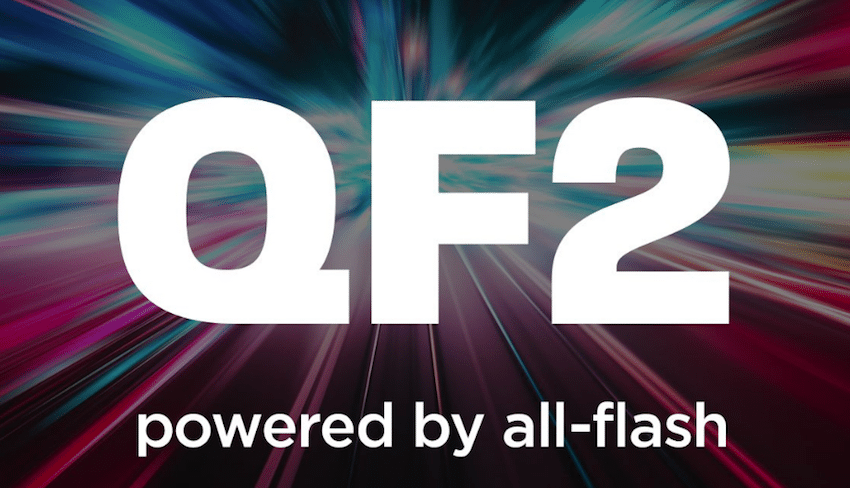 Today Qumulo made the bold statement that it will be providing the highest performance all-flash file storage system on modern industry-standard hardware by extending its Qumulo File Fabric (QF2) into on-premises all-flash instances. Several workloads need the highest performance possible, large-scale datasets for machine learning applications, genomic sequencing and analysis, high-resolution video editing and scientific computing and Qumulo's QF2 all-flash storage clusters are designed to serve them. The company claims that it can now hit performance speeds of 4GB/s per node, 16GB/s for a minimum four-node cluster, and up to 1.6TB/s of throughput on a 400-node QF2 system.
Today Qumulo made the bold statement that it will be providing the highest performance all-flash file storage system on modern industry-standard hardware by extending its Qumulo File Fabric (QF2) into on-premises all-flash instances. Several workloads need the highest performance possible, large-scale datasets for machine learning applications, genomic sequencing and analysis, high-resolution video editing and scientific computing and Qumulo's QF2 all-flash storage clusters are designed to serve them. The company claims that it can now hit performance speeds of 4GB/s per node, 16GB/s for a minimum four-node cluster, and up to 1.6TB/s of throughput on a 400-node QF2 system.
Today Qumulo made the bold statement that it will be providing the highest performance all-flash file storage system on modern industry-standard hardware by extending its Qumulo File Fabric (QF2) into on-premises all-flash instances. Several workloads need the highest performance possible, large-scale datasets for machine learning applications, genomic sequencing and analysis, high-resolution video editing and scientific computing and Qumulo's QF2 all-flash storage clusters are designed to serve them. The company claims that it can now hit performance speeds of 4GB/s per node, 16GB/s for a minimum four-node cluster, and up to 1.6TB/s of throughput on a 400-node QF2 system.

Breakthroughs that were once thought to be a long way off into the future seem to be happening left and right. These breakthroughs have been possible with the massive computational scale of advanced, highly distributed software running on modern, standard hardware, both in the data center and in the public cloud. Noting that there was a need for file-storage system that can meet these high performance workloads, Qumulo extended QF2 to all-flash instances with massive performance gains and helping said market continue making breakthroughs.
QF2 didn't hit the all-flash market with older SATA or SAS technology, it is using NVMe technology to hit the maximum amount of performance possible. Also from a hardware perspective, it is leveraging Intel Xeon Gold (Skylake-SP) CPUs and uses dual 100GbE or 40GbE QSFP+ NICs. Qumulo doesn't use proprietary hardware either, everything is off-the-shelf to lower costs. Not only can QF2 run in data centers, it can also run on AWS. QF2 clusters in the data center and AWS can work together to form a "globally distributed but highly connected storage fabric that is tied together with continuous replication."
Key features include:
- Highest performance all-flash storage. Delivering 4GB/s of throughput in a single node, 16GB/s for a minimum four-node cluster and up to 1.6TB/s for a 400-node cluster, QF2 delivers the world’s highest all-flash read performance on standard hardware to enable machine learning applications, genomic sequencing and analysis, and scientific computing. In addition to top cluster-wide, multi-stream performance, QF2 for all-flash has outstanding single stream performance that enables scenarios such as high-resolution video editing.
- Built with the future in mind. Rapid delivery of advanced software features, combined with competitively priced, commercially available standard hardware, delivers unmatched economic benefits and continuous innovation. Riding the cost curve of standard hardware, such as NVMe SSDs, the latest processors and advanced networking components, QF2 creates the best price performance for all-flash file storage and makes new application areas economically feasible for customers.
- Unified file fabric. All-flash is just one of the runtime environments available for QF2, which runs in the data center and in the public cloud. Continuous replication moves the data where it’s needed when it’s needed, which means that all-flash workloads won’t be relegated to a silo in the data center.
- Real-time control. QF2’s advanced, real-time visibility and control lets users tune their high-performance, all-flash workloads for optimal use of performance and capacity. QF2’s analytics let administrators drill down to the file level, get answers and troubleshoot problems in real-time.
- The world’s most scalable file system. QF2 can scale to billions of files, and handles small files as efficiently as large ones.
- Cloud-based monitoring. Qumulo proactively detects potential problems, such as SSD failures, allowing users to access historical trend data about how their all-flash storage is being used.
Sign up for the StorageReview newsletter
